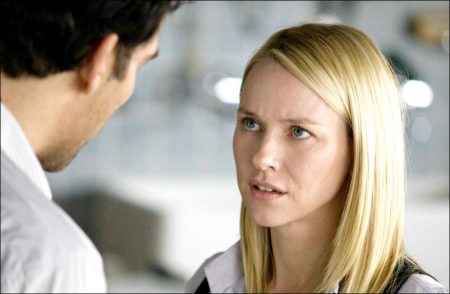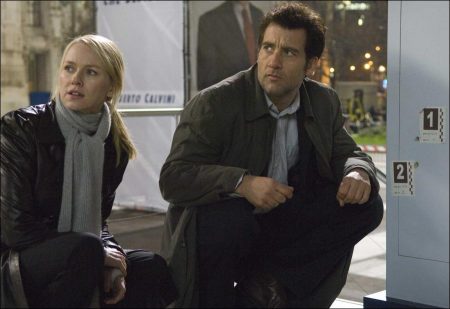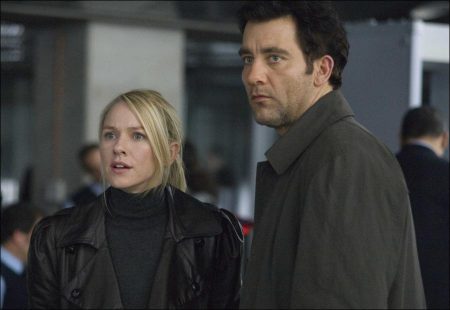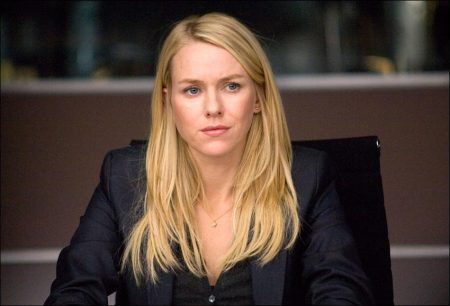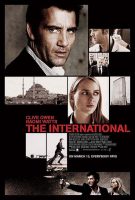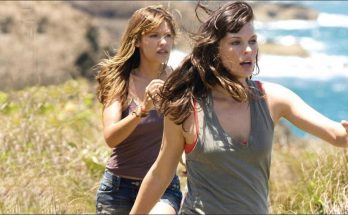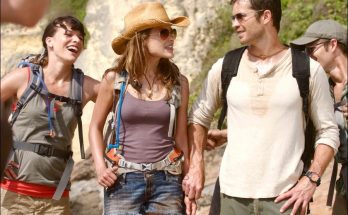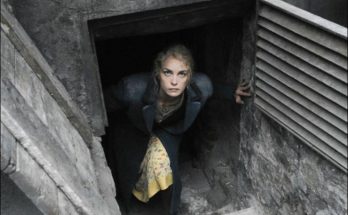Taglines: Sometimes a man can meet his destiny on the road he took to find it.
The Interpol Agent Louis Salinger and his partner are investigating the International Bank of Business and Credit (IBBC). This investigation is with with the District Attorney, Eleanor Whitman, from Manhattan in a two hundred million dollars illegal business of weapons trading. They schedule a meeting with an insider informer from IBBC at the Central Station in Berlin; however his partner is mysteriously killed after the encounter. Salinger finds the identity of the informer when he sees that the Vice President of Acquisitions André Clement had died in a car accident.
Salinger and Whitman head to Milan where they meet the politician Umberto Calvini, who is a big arms manufacturer, and he explains that IBBC is interested in buying the missile guiding system that he produces in his factory. When Calvini is murdered by a sniper in a political rally, Salinger and Whitman head to New York following the killer and later to Istanbul, and disclose a scheme of arms supply and destabilization of governments to make their nations slaves of debt. Further, the bank is protected by legal systems and only if Salinger crosses the line he might bring some justice to the corrupt system.
The International is a 2009 German–American political thriller drama film directed by Tom Tykwer. The film follows an Interpol agent and an American district attorney who investigate corruption within the IBBC, a fictional merchant bank based in Luxembourg. It serves organized crime and corrupt governments as a banker and as an arms broker. The bank’s ruthless managers assassinate potential threats including their own employees.
Inspired by the Bank of Credit and Commerce International (BCCI) scandal of the 1980s, the film’s script, written by Eric Warren Singer, raises concerns about how global finance affects international politics across the world. Production began in Berlin in September 2008, including the construction of a life-size replica of New York’s Guggenheim Museum for the film’s climactic shoot-out scene. The film opened the 59th Berlin International Film Festival on 5 February 2009. Reviews were mixed: some praised the sleek appearance and prescient themes—The Guardian called it a thriller with “brainpower as well as firepower”—but The New Yorker criticised the development of the characters.
About the Film
“The International is about two people who attempt to overcome forces much bigger than they are,” says producer Charles Roven. “We’re all pawns in the world of big corporations and our destinies are being tugged and pulled by their plans for us. But the film shows us that no matter how insignificant we may feel, we as individuals can make a difference.”
In the film, Interpol agent Louis Salinger (Clive Owen) and Manhattan Assistant District Attorney Eleanor Whitman (Naomi Watts) are driven by the pursuit of justice to take down the most powerful foe imaginable: an international bank with financial and political tentacles that reach into the world’s houses of government. Though their task seems impossible, they are determined to take down the bank, which has proven it will stop at nothing, even murder, to advance its own interests.
If the story seems ripped from the headlines, says director Tom Tykwer, it’s because the headlines have shown that the banks do control all aspects of our lives. “The mess we’re in now started when the banks took advantage of people and encouraged them to live way beyond their means,” he says. “The banks’ decisions had far-reaching effects – our houses are at risk, our jobs are at risk, ultimately the entire quality of our lives. Global business has developed into an empire with executives of leading corporations – for whom the public doesn’t vote – exerting an enormous influence over politics, the economy, our everyday lives, everything.”
And though The International is a work of fiction that raises the stakes appropriately for a thriller, Tykwer says that the central issue remains the same. “At the core there are two ordinary human beings – people like you and me – fighting a cold-blooded corporate beast that appears unstoppable. I think anyone can relate to their struggle,” he says.
That interest in exploring the heroism of individuals against overpowering forces and overwhelming odds has become a Tykwer trademark. “Salinger is not only fighting to uncover the bank’s crimes, but he’s fighting an ideological battle,” explains the director. “The executives run the world like a business rather than a place in which humans live and derive meaningful connection. They are pragmatists first and foremost, and Salinger wants nothing to do with their world view.”
When he first read the script, Tykwer’s interest was piqued by a key scene: the story’s hero, Louis Salinger, encounters the bank’s assassin by chance on a Manhattan street and an unpromising lead turns into a momentous shift in the case. The quiet tension of that scene, as Salinger and his colleagues follow the assassin, builds to a climax at the Guggenheim Museum. “That scene left an indelible impression and struck me as a great movie moment,” Tykwer recalls. “As the Guggenheim museum events unfolded immediately thereafter, I began to think this could become an interesting film. The last 40 pages of the script made it for me.”
“I think Tom is a real visionary,” Owen says of the director. “He has a fantastic sense of film style and a humanity that informs all his work. Perfume, Run, Lola, Run, Heaven, they’re all stylistically very interesting, modernist, and diverse, with strong characters. But, in addition, his sense of compassion and understanding of the human condition is an important dimension to his work.”
“Tom had a very specific vision for what he wanted,” says Roven. “But he’s also a great collaborator. He understands what everybody’s role is and he brings with him a great team that he’s been working with since the beginning of his filmmaking career. He’s one of the best people I’ve ever worked with in terms of not only how he sets up a movie but how he executes it. He gets amazing performances – he’s doesn’t just shoot the script, he enhances it with every scene.”
“He brought a level of excitement to every meeting starting from the first day I met him several years ago,” says producer Richard Suckle. “He has such tremendous energy and simply loves making movies. He’s a filmmaker with whom you really want to make the long journey movies require.”
Though a work of fiction, The International was inspired by the real life drama surrounding the downfall of the Bank of Credit and Commercial International. Founded in Karachi, Pakistan in the 1970s by Agha Hasan Abedi, the international bank quickly turned into the most pervasive money laundering operation in history. In addition to financial services, the bank ran a brisk sideline business in arms trafficking, turnkey mercenary armies, intelligence, and support of terrorism. Legislators in the UK and US finally unearthed these dealings in 1991 as the bank collapsed.
Eric Warren Singer, the screenwriter, says that the real-life BCCI scandal was “the largest criminal corporate enterprise in the history of the world. Over the past few years, culminating with the current financial crisis, we have seen an unprecedented escalation of corporate greed, but what fascinated me about BCCI was that it was more than simply greed; they were the bank for those who operate in the black and grey latitudes of this world – intelligence organizations, drug dealers, organized crime, and third world tyrants looting their own countries.
The BCCI was a full service bank that could provide its clients with a wide range of services. Whether it was moving your money anywhere in the world without a trace, having someone killed or anything in between, BCCI was the bank you could trust. And they were able to operate with impunity because just like terrorist organizations and organized crime, governments around the world – including our government – also needed and used their services.
Although the BCCI was shut down in the 90’s, there are banks that are engaged in the same type of business today – laundering money, promoting and fostering conflict in order to profit from the debt that it creates. The bank in our film is the 21st century version of BCCI and like its real world counterparts, is much more sophisticated and therefore destructive than its forbearer. The BCCIs of today have learned from the mistakes of the past and have created organizations whose structures are so complicated and Byzantine that it’s almost impossible for authorities to track and successfully prosecute them for their illegal activities.”
Though the BCCI provided inspiration, Singer says that by making a contemporary work of fiction the film could relate well to modern audiences at a time when he sees shades of the scandal in the news. “Although this film was rooted in events of the past, it was important to all of us that it be relevant to the present – and unfortunately, I don’t think anyone can dispute the striking parallels. At the time, the BCCI was the biggest Ponzi scheme ever, now only eclipsed by the Madoff scandal. The BCCI was one of the first international banks to aggressively pursue the practice of predatory lending,” he says, “and now the entire world financial system is experiencing its worst crisis since the Great Depression as a result of predatory lending and the unscrupulous manipulation of debt. The same lending principles used by credit card and mortgage companies to indebt individuals in the first world is utilized to enslave entire countries in the third world.”
In addition, says Tykwer, poetic license allowed the filmmakers some freedom in creating a thriller. “We didn’t want to hide the thriller behind a curtain of facts and elements to prove how closely related it is to actual events,” says the director. Adds Singer, “We were always aware that we wanted this film to have the engine of a quintessential 70’s thriller. We were trying to strike a balance between a film that was weighty enough to feel like an expose but had the velocity and visceral tension of a classic paranoid thriller.”
That The International called for an international shoot, filming in four countries, across two continents was irresistible for the filmmaking team. Producer Lloyd Phillips, a veteran of productions ranging from Beyond Borders to Twelve Monkeys, says, “Filmmaking, like so many other things, has become more global.
Studios are shooting in Russia for Russia, and in China for China, or in India for India. I love making movies in different parts of the world because the crews are getting better and better. Shooting in as many countries as we did on The International required careful planning, but the result is a huge amount of gratification.”
Continue Reading and View the Theatrical Trailer
The International (2009)
Directed by: Tom Tykwer
Starring: Clive Owen, Naomi Watts, Brían F. O’Byrne, Ulrich Thomsen, Armin Mueller-Stahl, Michel Voletti, Patrick Baladi, Haluk Bilginer, Nilaja Sun, Alessandro Fabrizi, Luca Barbareschi
Screenplay by: Eric Singer
Production Design by: Uli Hanisch
Cinematography by: Frank Griebe
Film Editing by: Mathilde Bonnefoy
Costume Design by: Ngila Dickson
Set Decoration by: Simon-Julien Boucherie
Art Direction by: Sarah Horton, Kai Koch, Luca Tranchino, Jennifer Santucci
Music by: Reinhold Heil, Johnny Klimek, Tom Tykwer
MPAA Rating: R for some sequences of violence, language.
Distributed by: Columbia Pictures
Release Date: February 20, 2009
Visits: 54
